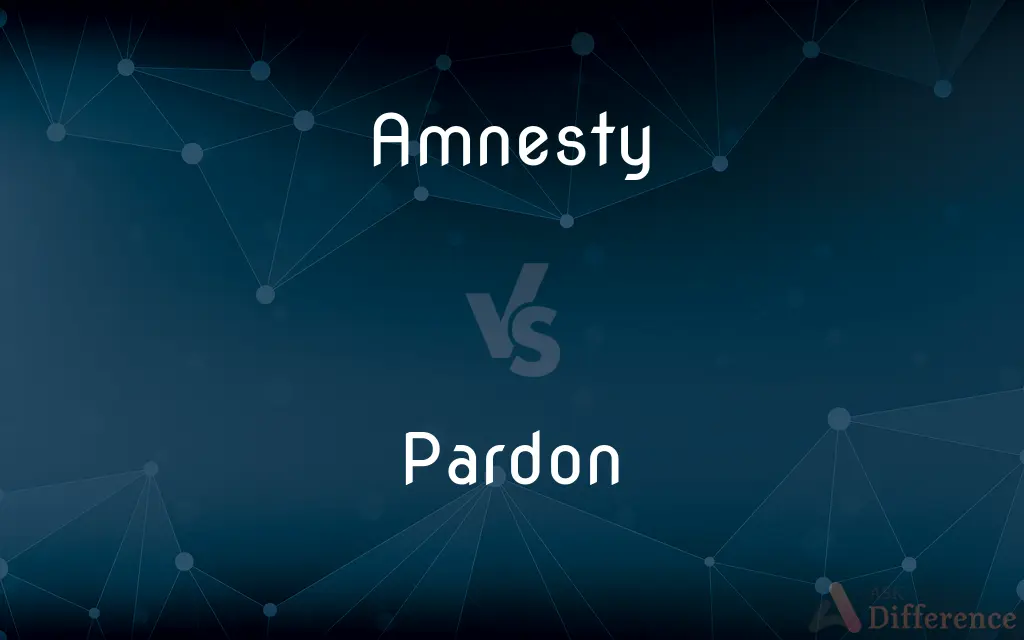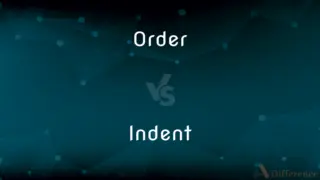Amnesty vs. Pardon — What's the Difference?
By Tayyaba Rehman — Updated on September 15, 2023
Amnesty is a general forgiveness for a group of people who have committed offenses, often political in nature. Pardon is an act by a governing authority that forgives a specific individual's criminal act.

Difference Between Amnesty and Pardon
Table of Contents
ADVERTISEMENT
Key Differences
Amnesty is a broad act that forgives a group of people, often for political offenses or minor crimes. Pardon is a more specific form of legal forgiveness, typically granted by a head of state, like a president or governor, to an individual for a specific crime. Amnesty is usually proactive, aiming to bring about social change or reconciliation, while a pardon is often reactive, coming after a conviction or completion of a sentence.
In terms of their legal impact, both amnesty and pardon have the effect of forgiving criminal offenses, but the scope is different. Amnesty often addresses multiple offenses or a class of offenses and usually applies to numerous people. Pardon focuses on a specific offense and is granted to an individual. The legal ramifications, therefore, are far-reaching with amnesty but highly specific with a pardon.
From a procedural standpoint, amnesty often doesn't require the rigorous legal scrutiny that a pardon does. For instance, amnesties can be enacted through legislation, executive order, or other broad means. Pardons usually go through a more detailed review process, often including legal consultation, recommendation, and sometimes even public opinion.
In summary, amnesty and pardon serve the purpose of forgiving legal offenses but do so in fundamentally different ways. Amnesty is broad and often used for political or social reasons, forgiving a group for certain offenses. Pardon is individualistic and often follows a thorough legal process, forgiving a specific person for a particular crime.
Comparison Chart
Scope
Broad, often applies to groups
Narrow, applies to individuals
ADVERTISEMENT
Offense Type
Usually political or minor crimes
Any criminal offense
Legal Procedure
Can be enacted by legislation or executive orders
Usually requires detailed legal scrutiny
Effect
Forgives and often eliminates penalties
Forgives but may not eliminate civil consequences
Authority
Granted by legislative or executive branch
Usually granted by a head of state
Compare with Definitions
Amnesty
A general forgiveness for a group of people who have committed offenses.
The government declared amnesty for all political protesters.
Pardon
Legal forgiveness for a specific individual's offense.
The president issued a pardon for the convicted man.
Amnesty
A legal provision that erases criminal offenses.
Amnesty was granted, wiping their records clean.
Pardon
An act that may follow a detailed legal review.
The pardon came after a thorough investigation.
Amnesty
An act that nullifies penalties for offenses.
The amnesty meant they no longer faced jail time.
Pardon
A pardon is a government decision to allow a person to be relieved of some or all of the legal consequences resulting from a criminal conviction. A pardon may be granted before or after conviction for the crime, depending on the laws of the jurisdiction.Pardons can be granted in many countries when individuals are deemed to have demonstrated that they have "paid their debt to society", or are otherwise considered to be deserving of them.
Amnesty
A tool for social or political reconciliation.
The amnesty aimed to reconcile warring factions.
Pardon
The action of forgiving or being forgiven for an error or offence
He obtained pardon for his sins
Amnesty
A broad act of clemency.
The amnesty covered various minor offenses.
Pardon
Forgive or excuse (a person, error, or offence)
I know Catherine will pardon me
Amnesty
Amnesty (from the Greek ἀμνηστία amnestia, "forgetfulness, passing over") is defined as "A pardon extended by the government to a group or class of people, usually for a political offense; the act of a sovereign power officially forgiving certain classes of people who are subject to trial but have not yet been convicted." An amnesty constitutes more than a pardon, in so much as it obliterates all legal remembrance of the offense. Amnesty is increasingly used to express the idea of "freedom" and to refer to when prisoners can go free.
Pardon
A request to a speaker to repeat something because one did not hear or understand it
‘Pardon?’ I said, cupping a hand to my ear
Amnesty
A general pardon granted by a government
Amnesty for military deserters.
Amnesty for tax evasion.
Pardon
To release (a person) from punishment or disfavor for wrongdoing or a fault
A convicted criminal who was pardoned by the governor.
Amnesty
To grant a general pardon to.
Pardon
To allow (an offense or fault) to pass without punishment or disfavor.
Amnesty
Forgetfulness; cessation of remembrance of wrong; oblivion.
Pardon
To make courteous allowance for; excuse
Pardon me, I'm in a hurry.
Amnesty
An act of the sovereign power granting oblivion, or a general pardon, for a past offense, as to subjects concerned in an insurrection.
Pardon
The act of pardoning.
Amnesty
To grant a pardon (to a group)
Pardon
Exemption of a convicted person from the penalties of an offense or crime by the power of the executor of the laws.
Amnesty
Forgetfulness; cessation of remembrance of wrong; oblivion.
Pardon
An official document or warrant declaring such an exemption.
Amnesty
An act of the sovereign power granting oblivion, or a general pardon, for a past offense, as to subjects concerned in an insurrection.
Pardon
Allowance or forgiveness for an offense or a discourtesy
Begged the host's pardon for leaving early.
Amnesty
To grant amnesty to.
Pardon
Roman Catholic Church An indulgence.
Amnesty
A period during which offenders are exempt from punishment
Pardon
Forgiveness for an offence.
Amnesty
A warrant granting release from punishment for an offense
Pardon
(legal) An order that releases a convicted criminal without further punishment, prevents future punishment, or (in some jurisdictions) removes an offence from a person's criminal record, as if it had never been committed.
Amnesty
The formal act of liberating someone
Pardon
(transitive) To forgive (a person).
Amnesty
Grant a pardon to (a group of people)
Pardon
(transitive) To refrain from exacting as a penalty.
Pardon
To grant an official pardon for a crime.
Pardon
Often used when someone does not understand what another person says.
Pardon
The act of pardoning; forgiveness, as of an offender, or of an offense; release from penalty; remission of punishment; absolution.
Pardon, my lord, for me and for my tidings.
But infinite in pardon was my judge.
Pardon
An official warrant of remission of penalty.
Sign me a present pardon for my brother.
Pardon
The state of being forgiven.
Pardon
A release, by a sovereign, or officer having jurisdiction, from the penalties of an offense, being distinguished from amnesty, which is a general obliteration and canceling of a particular line of past offenses.
Pardon
To absolve from the consequences of a fault or the punishment of crime; to free from penalty; - applied to the offender.
In this thing the Lord pardon thy servant.
I pray you, pardon me; pray heartily, pardon me.
Pardon
To remit the penalty of; to suffer to pass without punishment; to forgive; - applied to offenses.
I pray thee, pardon my sin.
Apollo, pardonMy great profaneness 'gainst thine oracle!
Pardon
To refrain from exacting as a penalty.
I pardon thee thy life before thou ask it.
Pardon
To give leave (of departure) to.
Even now about it! I will pardon you.
Pardon
The act of excusing a mistake or offense
Pardon
A warrant granting release from punishment for an offense
Pardon
The formal act of liberating someone
Pardon
Accept an excuse for;
Please excuse my dirty hands
Pardon
Grant a pardon to;
Ford pardoned Nixon
The Thanksgiving turkey was pardoned by the President
Pardon
An executive act nullifying a criminal penalty.
The pardon erased the remaining prison sentence.
Pardon
A grant of clemency for a specific crime.
She received a pardon for her past mistakes.
Pardon
An individualized form of legal forgiveness.
Unlike amnesty, a pardon is specific to one person.
Common Curiosities
Who can grant a pardon?
A pardon is usually granted by a head of state.
Is amnesty for individuals or groups?
Amnesty is usually for groups of people.
Who can grant amnesty?
Amnesty can be granted by legislative or executive branches.
Is a pardon for individuals or groups?
A pardon is for individuals.
Does amnesty require legal scrutiny?
Amnesty often doesn't require rigorous legal scrutiny.
What is amnesty?
Amnesty is a broad act that forgives a group of people for offenses, often political or minor crimes.
Can amnesty erase penalties?
Amnesty often eliminates penalties for offenses.
What is a pardon?
A pardon is legal forgiveness granted to an individual for a specific offense.
What types of offenses does a pardon cover?
A pardon can cover any criminal offense.
What types of offenses does amnesty cover?
Amnesty often covers political offenses or minor crimes.
Does a pardon erase penalties?
A pardon forgives but may not eliminate civil consequences.
Does a pardon require legal scrutiny?
A pardon usually requires detailed legal scrutiny.
How is a pardon enacted?
A pardon usually follows a detailed review and is granted by executive authority.
How is amnesty enacted?
Amnesty can be enacted through legislation or executive orders.
Share Your Discovery

Previous Comparison
Order vs. Indent
Next Comparison
Duchess vs. CountessAuthor Spotlight
Written by
Tayyaba RehmanTayyaba Rehman is a distinguished writer, currently serving as a primary contributor to askdifference.com. As a researcher in semantics and etymology, Tayyaba's passion for the complexity of languages and their distinctions has found a perfect home on the platform. Tayyaba delves into the intricacies of language, distinguishing between commonly confused words and phrases, thereby providing clarity for readers worldwide.















































